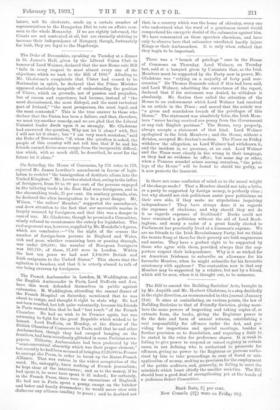The French Ambassador in London, M. Waddington, and the English
Ambassador in Paris, Lord Dufferin and Ave, have this week defended themselves in public against calumnies. M. Waddington, attending the annual dinner of the French Hospital on Saturday, mentioned that he was about to resign, and thought it right to state why. He had not been recalled, but left quite voluntarily, because his friends in Paris warned him that he had "lost touch" of the French Chamber. He had no wish to be Premier again, but was returning to fight for the great Republic which wished to be honest. Lord Dufferin, on Monday, at the dinner of the British Chamber of Commerce in Paris, said that he and other Ambassadors, though they had escaped hanging on the frontiers, had been mercilessly gibbeted in some Parisian news- papers. Hitherto, Ambassadors had been protected by the " seinieonventnal obscurity which was their proper element," but recently he had been accused of bringing £120,000 to France to corrupt the Press, in order to break up the Russo-French Alliance. That was untrue in the widest acceptation of the word. He, unhappily, knew nothing of French journalists; be kept clear of the interviewer; and as to the money, if he had spent it, he must have spent it ill indeed; for certainly, in the French Press, there were no encomiums of England. He had not in Paris spent a penny, except on the butcher and baker and family dressmaker, he would never view with disfavour any alliance tending to Peace; and he doubted not
that, in a country which was the home of chivalry, every one who understood what the word of a gentleman meant would comprehend his energetic denial of the calumnies against him. We have commented on these speeches elsewhere, and have only to observe here that calumnies unrefuted hardly injure Kings or their Ambassadors. It is only when refuted that they begin to be important.


































 Previous page
Previous page